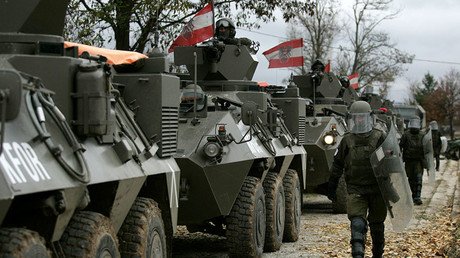NATO aims to wow Trump at summit as burden-sharing & other issues loom
Donald Trump’s next foreign stop is Brussels, where he is to take part in a NATO meeting. Members are aiming to impress the new US president, who used to call the military alliance “obsolete,” while demanding more contributions to it from European allies.
During the two-day visit to the Belgian capital, the American leader is to take part in unveiling NATO’s new headquarters after almost two decades of construction. He will also present a piece of wreckage from the Twin Towers as part of a memorial to the victims of the September 2001 terrorist attacks.
The allies hope the ceremony will remind Trump that 9/11 was the only event that has prompted an Article 5 response from NATO, which is the military block’s core provision for collective defense. Unlike senior members of his administration, Trump has never publicly endorsed Article 5, while some of his remarks have given the impression that the US’ willingness to help in a crisis could depend on how much the Europeans invest in the alliance.
Trump branded NATO an obsolete organization during the presidential campaign, though he retracted his remarks after taking office. Nonetheless, the failure of the majority of allies to spend two percent of their GDP on defense remains a sore issue for the Trump administration. Only the US, Britain, Poland, Estonia, and Greece met their spending targets last year.
The Trump administration also wants the military alliance to play a more significant role in fighting terrorism and, particularly in battling the Islamic State group. While some NATO allies are part of the US-led anti-IS coalition, the organization itself has kept its distance from the conflict, limiting its involvement to providing AWACS aircraft patrols and other intelligence operations.
Shortly before Trump left on his first foreign trip, the possibility of the US withdrawing from NATO was reportedly reiterated by a senior White House official.
Full quote from senior White House official on Trump threat to leave #NATO right here: pic.twitter.com/RTbOq2vg1w
— Philip Crowther (@PhilipinDC) May 17, 2017
The meeting also comes on the heels of a scandal in the US over allegations that the Trump team colluded with Russia. The accusations were further fueled last week after the president met with Russian Foreign Minister Sergey Lavrov in the White House. Some media claimed that Trump inadvertently exposed a major intelligence asset by bragging about classified information obtained from it to the visiting Russian minister.
As several NATO members, including Poland and the Baltic states, consider Russia a major threat to their national security, the incident likely didn’t boost their confidence in Washington’s protection.
The entire military alliance was reinvigorated in 2014 after the political crisis in Ukraine put countering Russia back at the forefront of its agenda, so Trumps’ position on both Russia and the alliance itself have been raising eyebrows in NATO.
America has not been the only source of discomfort for the alliance. Turkey has been taking an increasingly confrontational line with other NATO nations. The Europeans are concerned about President Recep Erdogan’s consolidation of power in Turkey, while Ankara is angry with Washington for supplying arms to Kurdish fighters in Syria that it considers terrorists.
In the latest sign of strain, NATO was forced to change its rules on partnership relations with non-member nations, because Turkey blocked cooperation with Austria.
Despite the hurdles, NATO officials hope for a positive tone, especially since it will be the first meeting after all 28 members ratified Montenegro as the bloc’s 29th ally.
“NATO’s strength allows us to defend our nations at home, to train partners abroad, and to engage in difficult but important dialogue,” the alliance’s secretary general, Jens Stoltenberg, said in a preview of the meeting’s agenda on Wednesday.













